
A service at the Youth Institute.

Young people from various MAM churches attended.
Institute Inspirations
I was asked to write about my time at the Youth Institute, and after some encouragement from some friends and fellow missionaries, I sit here and write about a time well spent.
It was my first time attending an Institute, so it was interesting to see how it worked. The Institute began at noon on Tuesday and lasted until Thursday evening. It was kind of like a mini Bible school, consisting of messages, activities, and prayer time. Oh, and we can’t forget the amazing meals and refreshment that we were cheerfully served. A BIG THANKS to the cooks who spent many hours making and serving food!
The schedule looked a little like this. 5:30–7:00 was our personal devotional time. 7:00–8:30 was breakfast, after which volunteers were selected to do dishes—usually four girls and four guys, which made it go faster. After breakfast was the first service. After each service was a sharing time.
The messages were very fitting for everyone present. The evening messages were shared by Duane Eby, one of the MAM board members from Maryland. They were very inspirational, and we were richly blessed.
On the final evening, there was great rejoicing when some who responded to the invitation gave their hearts to the Lord for the first time. It was so precious to witness. Please remember these new believers when you pray for us down here, and for all of us, that we would fight the good fight and run the race to the finish line. May God bless you all where He has called you to serve Him.
~ Kayla King
Editorial – Trials
Now the just shall live by faith: but if any man draw back, my soul shall have no pleasure in him. But we are not of them who draw back unto perdition; but of them that believe to the saving of the soul. Hebrews 10:38, 39.
These words from the writer of Hebrews come after a lengthy discourse on the superiority of the new covenant as well as an admonishment to his readers of the danger of turning back to their old life. The writer also writes, He that despised Moses’ law died without mercy under two or three witnesses: of how much sorer punishment, suppose ye, shall he be thought worthy, who hath trodden under foot the Son of God, and hath counted the blood of the covenant, wherewith he was sanctified, an unholy thing, and hath done despite unto the Spirit of grace?
We often pass through trials in the Christian life. At times it appears that believers have more trials than unbelievers, but this should not surprise us. Hebrews tells us in another place, But if ye be without chastisement, whereof all are partakers, then are ye bastards, and not sons.
Are you a child of God? I would like to think further on trials. When writing to the Corinthians, Paul refers to the children of Israel as our examples. Moreover, brethren, I would not that ye should be ignorant, how that all our fathers were under the cloud, and all passed through the sea; and were all baptized unto Moses in the cloud and in the sea; and did all eat the same spiritual meat; and did all drink the same spiritual drink: for they drank of that spiritual Rock that followed them: and that Rock was Christ. But with many of them God was not well pleased: for they were overthrown in the wilderness. Now these things were our examples, to the intent we should not lust after evil things, as they also lusted. 1 Corinthians 10:1-6.
Now the children of Israel all went through the same trials. As Paul says, they had the same meat and drink, but for some reason many of them died in the wilderness because God was not well pleased with them. Why did some reach the promised land but others not? Obviously people respond to trials differently. I am sure Joshua and Caleb were just as tired as the rest of eating manna, “this light bread,” as the people called it. Paul goes on to say, “Wherefore let him that thinketh he standeth take heed lest he fall”—a warning to those who think themselves strong.
I would like to consider one incident that perhaps illustrates another reason why the children of Israel failed the Lord so many times. In Exodus 20 we find the Ten Commandments; after the Ten Commandments we find a verse that reads, And all the people saw the thunderings, and the lightnings, and the noise of the trumpet, and the mountain smoking: and when the people saw it, they removed, and stood afar off.
Now I was not there. Had I been there, I might have been the first to run. But a later verse shows Moses comforting the children of Israel. And Moses said unto the people, Fear not: for God is come to prove you, and that his fear may be before your faces, that ye sin not. God came to show His power so that the people would fear Him, and the people fled.
History was made and the story was written. We can never know what might have been. But I have often wondered if the story would be different if the Israelites had stayed and listened to God speaking to them. Yes, they were scared, but the scare didn’t last long. They promised profusely that they would do all the Lord asked of them, but not long after, they were worshiping a golden calf, already having turned away from God.
Would have they have remained faithful had they stayed and listened? We don’t know, but we do know that as Christians, God refines and purifies us. Many times, like the Israelites, God wants to show us His power, but we run away. We say, “God, it’s too hard.” But can we say, as Job said, “But he knoweth the way that I take: when he hath tried me, I shall come forth as gold”?
God bless.
~ Dale Lee
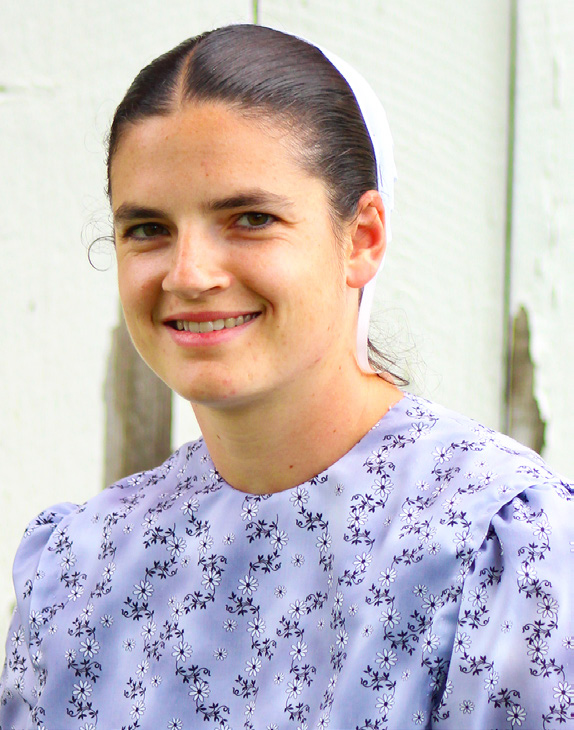
Laura Wenger came to Guatemala
as a WATER student this summer
My WATER Experience
Recently I had the opportunity to spend a month in Guatemala with Mennonite Air Missions. It was a full month: seeing new places, doing new things, eating new food, trying to learn a new language, and meeting new people. But by the end of the month, when it was time to leave, I found I didn’t want to. Why not?
I’ll start with the new places. I had never been to Guatemala before, so everywhere I went was new—at first. But Headquarters in Guatemala City soon felt like home—the place I came back to after each visit to another outreach.
I spent a whole week in Oratorio, a cute little town southwest of the city. From there one day was spent in Pasaco, and afterward we waded in the Pacific Ocean and watched a herd of cows wander past us on the beach.
I spent two days in Santa Rosita, a tiny village by a river far to the north. Usually north means cooler, but in this case, it meant warmer, because the other places I visited were in mountainous regions at various altitudes.
I spent three days in the Quiche area northeast of the city, visiting three congregations. It was there that I saw some of the most beautiful scenery and the most interesting roads.
Most of my days filled with doing whatever the other ladies were doing at the time. Many of these things I had done before, like washing dishes, housecleaning, sewing, and cooking. Some things had a different twist, like washing dishes in a pila, sewing for beggars, and cooking things like empanadas and güisquil. Some things were altogether new. It was exciting to take a boat up the river in the dark and catch crabs on the rock ledges, even if I was slightly disappointed not to see any alligators.
I enjoyed helping with children’s classes, though I would have loved to be able to talk to the children. In spite of not understanding the language, I still found it interesting to visit native homes, especially the simple tin-roofed structures that were home to both animals and people, whose interiors were unlit and blackened by years of cooking over a fire. It was a new experience to have a Sunday dinner of sweet bread and fire-roasted corn, to drop an occasional kernel for the duck, goose, or chicken at my feet, and then toss the empty cob to the pig roaming the yard. I managed to catch a gecko once, and sure enough, the tail came off!
Trying to talk a new language was mostly just an inconvenience, since I was usually around people who could speak both Spanish and English. But when church services came (and they did quite frequently), I was somewhat lost. I knew enough Spanish to catch most of the references, and by following along in my Spanish- English Bible, I could at least get an idea of the speaker’s intent. Sunday school books were a big help; they allowed me to take my time comprehending, since it isn’t possible to listen any slower than the speaker speaks. It was encouraging how my limited Spanish improved in a month’s time.
All of the things I have mentioned made my stay enjoyable, but what made it really hard to leave was the people I came to know and love. I was at twelve different church services, but would I have enjoyed them if I had been left to feel like the outsider I was, rather than welcomed as a sister? Wouldn’t Oratorio have felt like a confining little town if I hadn’t found friends there? Going crabbing would have been just another chore if there were less than loving words exchanged. Reviewing pictures of the scenery in Quiche would bring a bad taste to my mouth if there had been a lack of love in the vehicle I was riding. The empanadas would not have differed much from sawdust if there had been tension in the air as I tried to eat. And the Spanish language— would I want to continue learning it if the words I heard had sounded accusing and hateful? So, you could say that what drew me to stay was the love of the people I met, but I want to take it a step further and say it was God; “for, where there is love, there is God.”
~ Laura Wenger
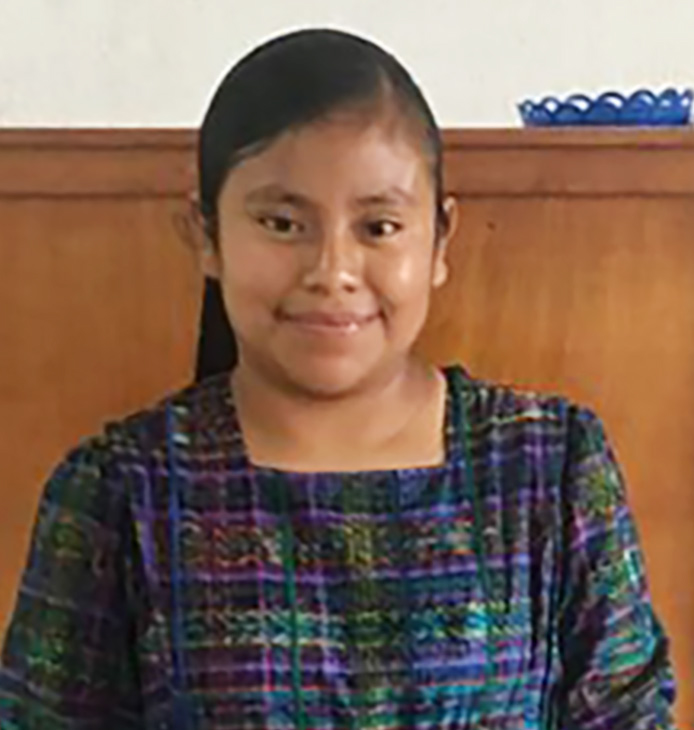
Karina Tucubal was baptized on June 9.
Baptism in Zaragoza
It was a joy and a blessing to attend the baptism of Karina Tucubal (age 19) of Tecpan on June 9. After three years of sporadic instruction classes, she was baptized and received into the church brotherhood of Puerta de las Aguas Church in Zaragoza, Chimaltenango. The church was filled with family and church friends. Wesley King, assisted by Jerlin Lopez, officiated. The baptism was followed by a Communion service, of which Karina was joyfully able to take part. A time of food and fellowship finished out the joyful occasion.
New Staff and Personnel Changes
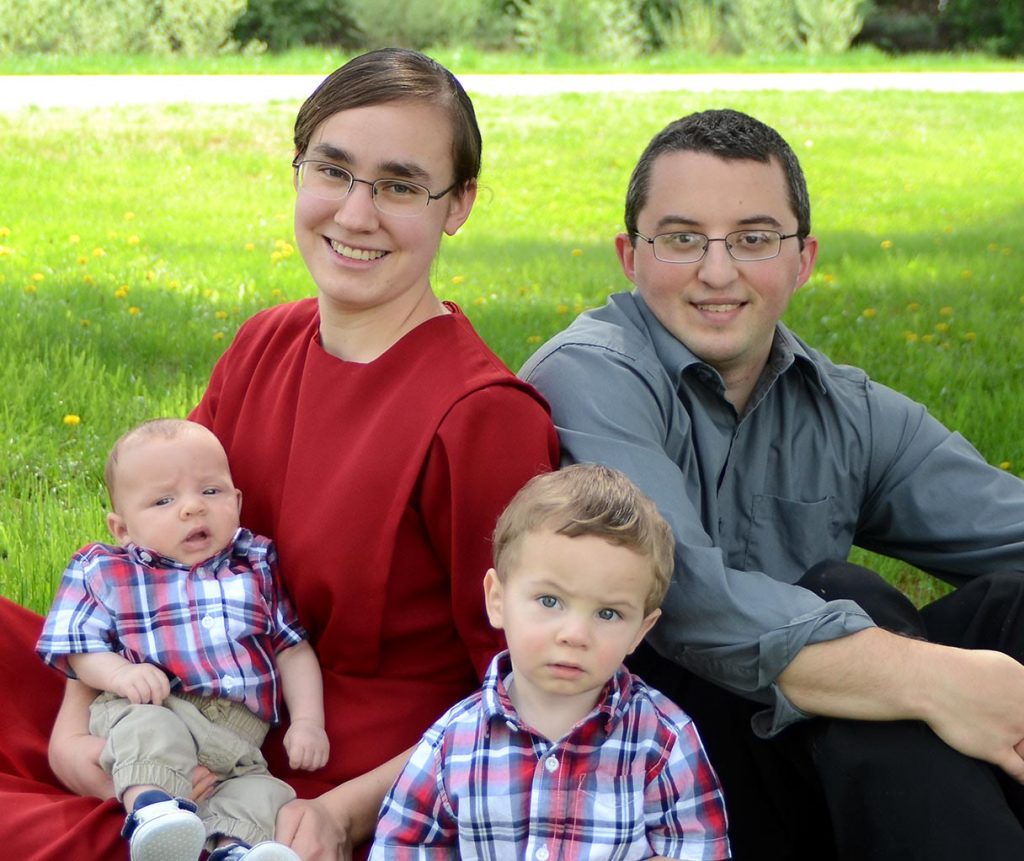
Justin and Lynnae Zimmerman will be serving in Mixcolajá.
Justin and Lynnae Zimmerman and their two little boys, Terrel (almost 2) and Caleb (5 months), arrived in Guatemala on June 7, from Shalom Mennonite Church in Milton, Pennsylvania. After a few stretching weeks of Spanish school, they moved to the beautiful mountain country of Mixcolajá. They’re settling in and are looking forward to getting out to visit the church folks soon. Nick Suarez has moved from San Bartolomé to Mixcolajá to live with the Zimmermans as they adjust and learn the language, and to be a personal worker among the youth.
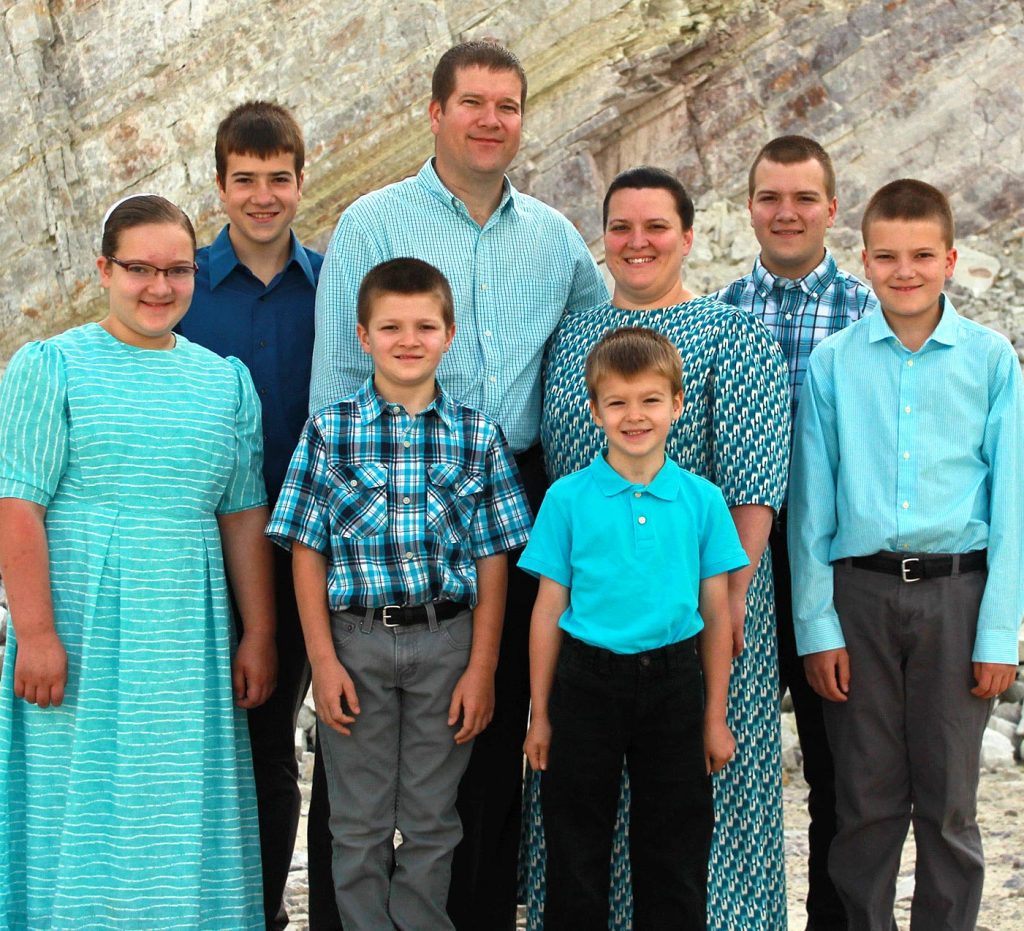
George and Rhonda Zimmerman and their family
will be living in Santa Rosita.
George and Rhonda Zimmerman and their six children, Alex, 17, Christopher, 15, Aaron, 13, Rebecca, 11, Eli, 9, and Moses, 6, left their old home in Mohnton, Pennsylvania, and began their land journey to Guatemala on July 25. They crossed the Guatemalan border on August 3 and finally arrived at Headquarters on Sunday, August 4. After spending a few days in Guatemala City, they will head to Santa Rosita to set up housekeeping before going to Spanish school in September.
Many personnel changes are happening in Santa Rosita. Delores Schmidt moved up after Youth Institute in July and plans to take on the role of schoolteacher for George’s and Dean’s children. Amy and Delores plan to move into the small house that had been occupied by the single fellows. Since Aaron King left in July, Jeff Lee has been preparing to move to Oratorio to work beside Daniel Meyer, helping with the church work in that area. Deans have been working to transform the old clinic into their new home.
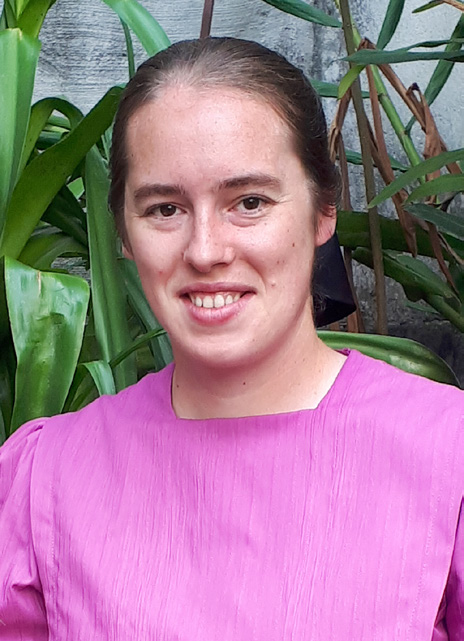
Elsie Miller is helping with the
cooking at MAM Headquarters
Elsie Miller has arrived from Living Hope Conservative Mennonite Church in Fredericktown, Ohio. As of June 6, Headquarters now has a new cook. She was able to fit in two weeks of Spanish school so far and looks forward to learning more in September. She also enjoys the weekly children’s class in the park every Saturday as well as taking care of the Mercy Room at the mission.

